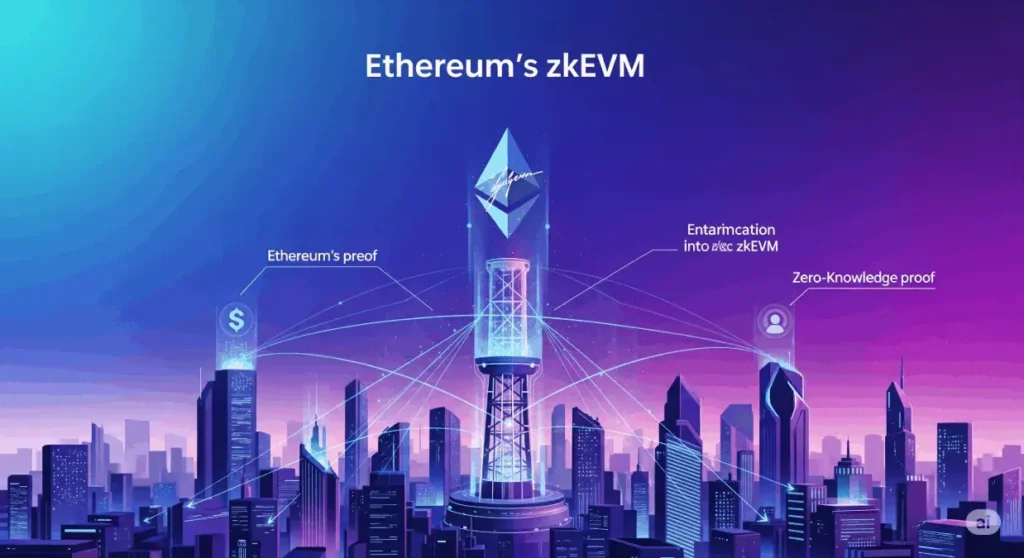Ethereum’s Bold Leap: Integrating zkEVM into the Core Protocol

Ethereum, the bedrock of decentralized applications, is on the cusp of a groundbreaking transformation. The Ethereum Foundation has unveiled an ambitious roadmap to integrate zkEVM capabilities directly into its base layer, setting a 12-month clock for an optional rollout. This strategic move, building upon Sophia Gold’s visionary “Realtime Proving” proposal, aims to fundamentally alter how the network processes transactions, replacing the current resource-intensive block re-execution with efficient, compact cryptographic receipts. This significant upgrade is poised to redefine Ethereum’s scalability, efficiency, and privacy, ushering in a new era for the blockchain ecosystem.
A One-Year Countdown to zkEVM Mainnet Debut
The next twelve months will be pivotal for Ethereum. The Foundation’s plan involves a phased introduction of zkEVM on the mainnet, designed to ensure a smooth and secure transition. Initially, a select group of validators will be invited to participate in Phase One, operating specialized Zero-Knowledge (ZK) clients in parallel with their existing software. This pilot program will serve as a crucial testing ground, allowing developers to monitor performance, identify potential issues, and refine the new system in a live environment. The gradual rollout is a testament to Ethereum’s commitment to network stability, prioritizing cautious integration over rapid, potentially disruptive changes.
As confidence in the new ZK clients grows, bolstered by comprehensive audits, rigorous formal verification processes, and incentivized bug bounties, the network will slowly begin to shift its operational paradigm. The ultimate goal is to transition from the current transaction replay model, where every node re-executes every transaction to verify block validity, to a more streamlined proof verification system. This shift means that instead of re-running computations, validators will simply verify compact cryptographic proofs attesting to the validity of transactions and blocks. This paradigm shift promises significant gains in efficiency, reducing the computational burden on individual nodes and paving the way for substantial increases in network throughput. Stakeholders across the ecosystem are anticipating a carefully managed transition that deftly balances the imperative for innovation with the critical need for system integrity and resilience.
Defining Real-Time zk-Proof Standards: The “Race to Real-Time”
At the core of this ambitious roadmap lies the stringent performance benchmark dubbed “real-time proving.” This set of rigorous standards is designed to push the boundaries of ZK technology, ensuring that the new system is not only secure and efficient but also practical for mainstream adoption. The specifications are demanding: proofs must verify an astounding 99% of blocks within a mere 10 seconds, guaranteeing near-instantaneous validation. Security is paramount, with a requirement for at least 128-bit security, a level considered robust enough to withstand sophisticated attacks.
Furthermore, the proofs themselves must be incredibly compact, compressing under 300 KiB (kilobytes) to minimize storage and transmission overhead. This small proof size is crucial for maintaining a lightweight network that can be easily accessed and operated by a wide range of participants. Finally, the system must be capable of running on commodity hardware costing no more than $100,000, consuming less than 10 kW of power. This affordability and energy efficiency are vital for decentralization, preventing the system from becoming exclusively accessible to large, well-funded entities.
Sophia Gold’s challenge to zkEVM teams to meet these formidable targets by Devconnect Argentina has ignited a spirited “race to real-time.” This competitive drive is fostering rapid innovation within the ZK community, potentially positioning Ethereum as the world’s largest live Zero-Knowledge application. Meeting these benchmarks will not only validate the efficacy of ZK technology at scale but also solidify Ethereum’s position as a leader in blockchain innovation, capable of delivering unprecedented levels of efficiency and security. The implications of achieving real-time proving are profound, promising a future where Ethereum can process a vastly greater number of transactions with enhanced privacy guarantees, all while maintaining its decentralized ethos.
Validator Adoption and Security Incentives
For the zkEVM integration to be successful, widespread validator buy-in is absolutely critical. The Ethereum Foundation understands this and has strategically designed a multi-faceted approach to accelerate adoption and incentivize participation. To begin, formal verification grants will be extended to developers and teams working on ZK client implementations, fostering a robust and secure development environment. Alongside this, expanded bug bounties will encourage the community to rigorously test the new clients, identifying and rectifying vulnerabilities before they can be exploited. Community-driven code reviews will further enhance the security posture, leveraging the collective expertise of Ethereum’s vast developer ecosystem.
While only a small cohort will initially run zkEVM clients, the Foundation is committed to providing comprehensive ecosystem support to encourage broader participation. This includes the establishment of dedicated “One Trillion Security” teams, whose sole focus will be on ensuring the cryptographic integrity and overall security of the new ZK-enabled network. Streamlined protocol development processes will also make it easier for new nodes to join and contribute to the network’s evolution. Over time, as the benefits of proof-checking become overwhelmingly apparent and the system demonstrates its stability and efficiency, it is anticipated that proof-checking will become a mandatory requirement for all validators. This mandatory shift will unlock significant advantages for the entire network, including substantially higher throughput and a marked reduction in computational costs, making Ethereum more scalable and economically viable than ever before. This phased approach to adoption ensures that validators are gradually onboarded, minimizing disruption while maximizing the potential for a secure and efficient transition.
Unlocking Ethereum’s zk-Friendly Future
Beyond merely scaling transaction capacity, native ZK-proofs promise to unlock a host of advanced capabilities for Ethereum. One of the most eagerly anticipated features is enhanced privacy. By leveraging ZK-proofs, transactions can be verified without revealing underlying sensitive information, enabling on-chain confidential data handling for a wide array of applications, from private voting systems to secure financial transactions. This represents a significant leap forward in addressing the privacy concerns that often plague public blockchains.
Another exciting prospect is signature aggregation. ZK-proofs can be used to combine multiple signatures into a single, compact proof, significantly reducing the data footprint of complex transactions and further enhancing network efficiency. This is particularly beneficial for applications with numerous participants, such as decentralized autonomous organizations (DAOs) or large-scale multi-signature operations. Furthermore, the integration of ZK-proofs will pave the way for richer smart-contract capabilities, enabling developers to build more complex and sophisticated applications that can leverage the unique properties of zero-knowledge cryptography.
Stay informed, read the latest crypto news in real time!
Once validators are able to efficiently verify multiple independent ZK proofs instead of re-executing every single transaction, Ethereum will fundamentally transform its operational model. This shift will not only support the aforementioned privacy enhancements and signature aggregation but also significantly empower advanced Layer 2 (L2) rollups. These L2 solutions, which currently rely on their own proving mechanisms, will benefit from native ZK support at the base layer, potentially leading to even faster, cheaper, and more secure rollup operations. The integration of zkEVM is not just an upgrade; it is a foundational shift that will cement Ethereum’s position as a leading platform for innovation in the decentralized world, ushering in an era of unprecedented scalability, privacy, and smart contract functionality. The future of Ethereum, powered by ZK technology, promises a more robust, efficient, and user-friendly blockchain experience for everyone.





One thought on “Ethereum’s Bold Leap: Integrating zkEVM into the Core Protocol”